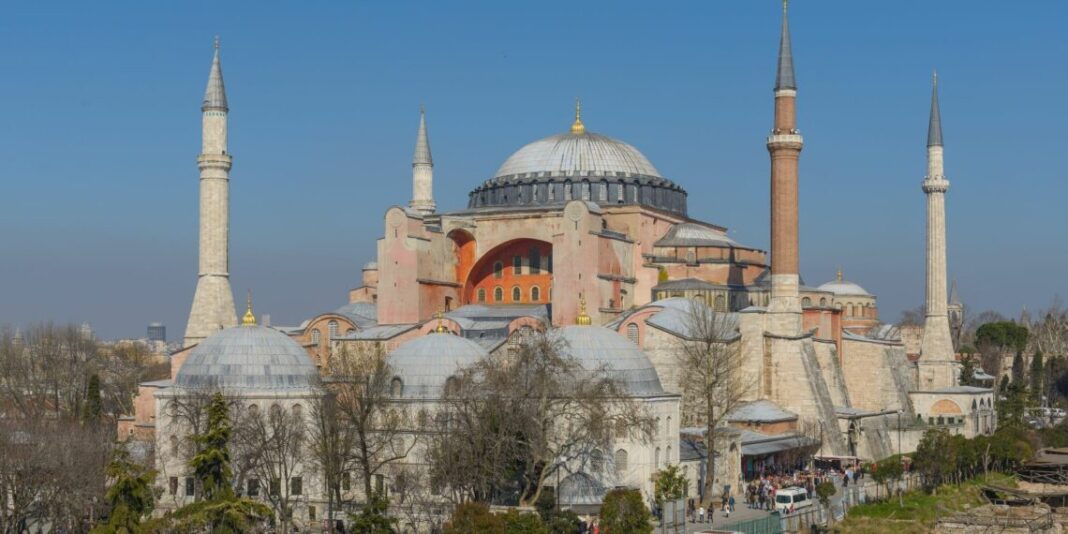 Delaware – USA
Delaware – USA
http://www.professors-PhDs.com
Mail: [email protected]
June 24, 2020
To: UNESCO
Members of United Nations
Members of European Parliament
cc: Global Media
We, the International Hellenic Association*, wish to inform the relevant international bodies about recent developments challenging the historical status of Aghia Sophia which display a disregard for the historical, cultural, and theological roots of Aghia Sophia. Turkish President Recep Tayyip Erdogan and other high-ranking officials have repeatedly expressed the view that the 6th-century monument, currently a museum, must be converted into a mosque.
The officials of the Turkish Republic have argued that the future of Aghia Sophia is a domestic affair of their country. However, in 2018 even Turkey’s supreme judicial authority, the Constitutional Court, again rejected a related petition that had previously been submitted to the same institution calling for Aghia Sophia to serve as a Mosque, closing the case permanently and irrevocably. Recent developments point to the troubling persistence on the part of Turkish officials to force the conversion of Aghia Sophia to a Mosque. But is it so simple? Certainly NOT!
The Aghia Sophia, a Byzantine Christian Cathedral until Constantinople’s fall in 1453, is now a museum and is a protected cultural site by UNESCO. It is not only a great temple of Christendom — the largest for many centuries — it also belongs to humanity. It has been recognized by UNESCO as part of our global cultural heritage.” In a blatant disregard for Aghia Sophia’s status as a world monument, on May 29 of this year a celebration was organized by the Turkish Ministry of Tourism and Culture and broadcast live on state television, the “Al-Fātiḥah sūrah”, a Muslim prayer dedicated to Mehmet II, was read inside the today’s UNESCO World Heritage Site.
Aside from having been built as one of the most important Christian houses of worship of the Greek Orthodox Church, Aghia Sophia is without doubt the most important historical site in the field of Byzantine studies. Aghia Sophia has been the focus of a variety of activity since its establishment as a secular Museum in 1936. In the 1930’s, the Byzantine Institute of America was responsible for conducting important work in the Church-Museum. The Institute’s restoration work was most invaluable in rediscovering the glorious Christian iconography that had been covered up for centuries since the Fall of Constantinople in 1453. More recently, scholars have conducted research within Aghia Sophia studying the space and acoustics within the great Church in order to study and capture as closely as possible the sound and experience felt by Christian believers in Byzantium before the conquest of the city. These significant activities in fact honor and pay homage to the Biblical, historical, and cultural roots of the Great Church, and should be encouraged as much as possible.
In point of fact, Aghia Sophia is on the list of the UNESCO World Heritage Sites. The aforementioned activities within Aghia Sophia prove unequivocally that cultural organizations, institutions of higher learning and Christian communities throughout the world have a vested interest in Aghia Sophia. Astonishingly, one Turkish official has advocated that certain mosaics on the walls of Aghia Sophia should be painted over. In addition, Turkey has announced plans to purchase rugs for use in Muslim prayer within Aghia Sophia. The conversion of Aghia Sophia will not only irreversibly damage the Byzantine iconography that was painfully restored during the 1930’s, but the desecularization of the Museum will make any further activity within Justinian’s Church by historians and scholars impossible.
We are cognizant of the fact that the conversion of Aghia Sophia is a troubling sign of further escalations against international peace that will ensue if Ankara is not vigorously challenged in this case. In fact, the international community has immediately condemned other instances of desecration of religious and cultural symbols including the destruction of the fifteen hundred-year-old Bamyan Buddhist statues by the Taliban in 2001. In addition, international organizations such as UNESCO condemned the destruction of the cultural heritage of Iraq and Syria by ISIS. We believe that the international community has an obligation to take a stance that is no less assertive and determined on the matter of Aghia Sophia than was taken previously on the matters of the Buddhist statues of Afghanistan and the cultural artifacts of Iraq and Syria.
Institutions such as UNESCO honor and respect temples of all religions. We ask that the Greek Orthodox Christian origins of Aghia Sophia be respected. We seek only a preservation of the present status of Aghia Sophia.
* The International Hellenic Association is a non profit and non-partisan organization of academics of Hellenic background advocating for the history and culture of Hellenism







